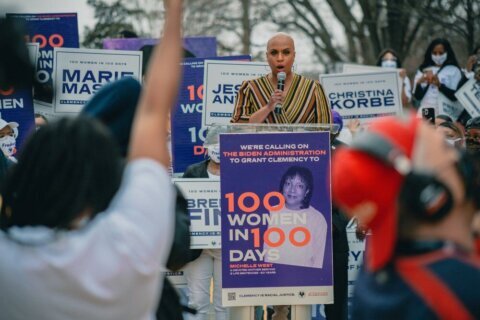WASHINGTON (AP) — A federal freeze on most evictions enacted last year is scheduled to expire Saturday, after President Joe Biden’s administration extended the original date by a month. The moratorium, put in place by the U.S. Centers for Disease Control and Prevention in September, was the only tool keeping millions of tenants in their homes. Many of them lost jobs during the coronavirus pandemic and had fallen months behind on their rent.
Landlords successfully challenged the order in court, arguing they also had bills to pay. They pointed out that tenants could access nearly $47 billion in federal money set aside to help pay rents and related expenses.
Advocates for tenants said the distribution of the money had been slow and that more time was needed to distribute it and repay landlords. Without an extension, they feared a spike in evictions and lawsuits seeking to boot out tenants who were behind on their rents.
Even with the delay, roughly 3.6 million people in the U.S. as of July 5 said they face eviction in the next two months, according to the U.S. Census Bureau’s Household Pulse Survey. The survey measures the social and economic effects of the coronavirus pandemic every two weeks through online responses from a representative sample of U.S. households.
Here’s the situation in Washington, D.C.:
WHAT’S THE STATUS OF EVICTION MORATORIUMS IN THE DISTRICT OF COLUMBIA?
Washington, D.C., has its own local ban on evictions, imposed by the District of Columbia Council in March 2020. The city’s moratorium is tied to the public health emergency declared by Mayor Muriel Bowser, which expired on July 25. But the council unanimously approved emergency legislation earlier this month that will effectively keep residents in their homes through the end of the year.
The new bill is characterized as a gentle phasing-out. District of Columbia Council President Phil Mendelson described it as “a more thoughtful end” to the moratorium. It allows landlords to resume sending notices of past due rent to tenants, but eviction filings for breaches of the lease can’t begin again until Jan. 1, 2022. In the interim, both landlord and tenant are asked to seek assistance from the city.
Tenants who were already slated for eviction before the ban was imposed can be removed from their homes starting Aug. 26. Local housing activists estimate that more than 250 families could be facing eviction under these rules.
WHAT’S BEING DONE TO HELP PEOPLE FACING EVICTION?
In April, Bowser devoted $350 million in federal aid to help qualifying tenants pay overdue rent and utility bills. But some members of the council have complained that not enough people are taking advantage of the program because the eviction ban was removing any sense of urgency. Tenant advocates and landlord groups also have complained that the distribution process has been prohibitively complex.
In May, the council briefly considered allowing eviction filings again to prompt tenants and landlords to take advantage of the aid, but the idea was voted down amid public criticism.
HOW ARE THE COURTS HANDLING EVICTION HEARINGS?
Landlords in the district remain prohibited from filing for eviction for nonpayment. The new emergency legislation extended that ban on filings through the end of the year. A group of landlords had sued to be permitted to start eviction proceedings that wouldn’t be carried out until after the ban was lifted. The case remains tied up in court.
HOW AFFORDABLE IS HOUSING IN THE DISTRICT’S RENTAL MARKET?
Affordable housing is a major problem in Washington, D.C., with rents rising as the city has become wealthier in recent years. Many Black tenants complain of being displaced by rapid gentrification. The district has long been majority Black, but that population has dropped below 50%.
Washington received more than $2.3 billion in federal funding from the American Rescue Plan, and Bowser devoted more than $500 million to a variety of programs to build more affordable housing or refurbish existing housing.
ARE EVICTIONS EXPECTED TO CREATE A SURGE IN HOMELESSNESS?
Bowser and the council seem intent on avoiding a wave of evictions as they have repeatedly sided with tenants. The district’s budget is flush with federal assistance money, and the city is focusing on more efficiently delivering that aid into the hands of both landlords and tenants. Immediately before the emergency legislation was passed, fresh census data in early July revealed that up to 16,000 District residents feared they would face eviction within the next two months. The new bill has bought those tenants several more months.
Copyright © 2024 The Associated Press. All rights reserved. This material may not be published, broadcast, written or redistributed.







